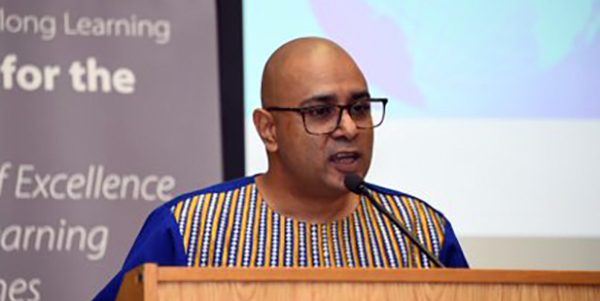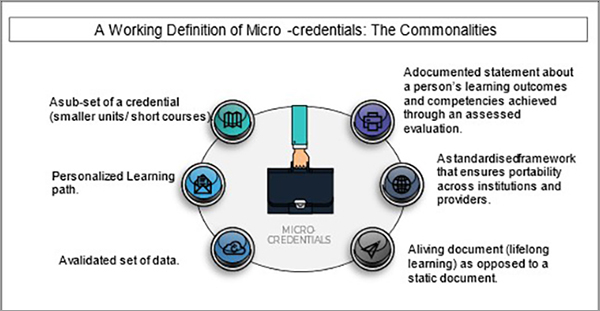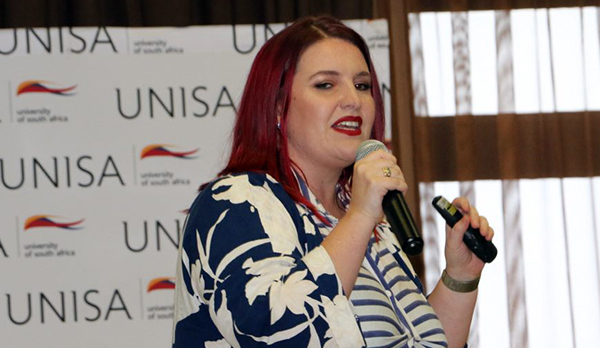
On Tuesday 13 December 2022, Unisa’s Centre for Lifelong Learning (UCL) held a ground-breaking hybrid seminar on micro-credentials and the opportunities they present in extending the value of short learning programmes (SLPs), giving more options to those wanting to gain additional knowledge and skills. The event was held in the Kgorong Building with online access via Zoom and broadcast on Facebook.

From left: Dr Denzel Chetty, Dr Genevieve James, Sam Kekana, Prof Zethu Nkosi, Prof Humphry Mogashoa and Jessica Nel
Dr Denzel Chetty was the keynote presenter and Jessica Nel joined him as a respondent. They shared insightful information, thoughts and ideas in their presentations.
A diverse audience consisting of civil society organisations, municipalities, entrepreneurs, NPOs, Unisa SRC representatives, professionals in business, academics and administrative staff of the university were all in attendance either in person or remotely.
Representing the university in her opening address, Prof Zethu Nkosi, Acting Executive Director of the College of Human Sciences, lauded the UCL for hosting the event on this relatively new subject of micro-credentials which, she said, showed leadership and foresight. She said that the SLPs are in line with the United Nations’ 2030 Agenda for sustainable development goal number one, which is to "End poverty in all its forms everywhere". "When we offer the SLPs, we are empowering the communities," she said. She expressed hope that the seminar would bear tangible fruits which would benefit the institution in the context of its adopted strategic focus.
Sam Kekana, the UCL's Acting Director, gave an overview of the centre’s role, activities and functions. Amongst others he mentioned that "the UCL is responsible for the coordination, execution and administration of non-formal programmes at Unisa, as well as for determining the strategic direction of the centre and its offerings".
Kekana also outlined the strategic importance of the centre in its role of bringing in third-stream income to Unisa, whilst being mindful of the university’s social mandate of access by and inclusivity of minority communities such as differently-abled persons, non-binary gender persons and the poorer members of South African society. He concluded that exploring this new area of micro-credentials would add to the centre’s wider offering of options to those wanting to hone their skills through short courses.

Dr Denzel Chetty delivering his keynote address
In his impassioned delivery, Chetty firstly outlined the heading of his keynote speech entitled "New trajectories for learning in the Global South: Towards a South African eco-system of micro-credentialing in higher education".
He presented the background and context of the developments which gave rise to learning, knowledge acquisition and skills development as propelled both by innovation and the Covid-19 pandemic as the disruptive catalyst which compelled adoption of digital transformation. Public policy around science, technology, engineering and mathematics (STEM) helped drive innovations, bringing about ubiquitous access to information which benefited new competencies of re-skilling and upskilling.
It is, said Chetty, in this context of information revolution, that micro-credentials also grew in popularity. As part of the lifelong learning process, development of micro-credentials should take place based on standardised framework that recognises prior learning, gives a documented statement about learning outcomes benchmarked as smaller units of standards, which are portable across institutions, and are assessed and evaluated objectively. These learning outcomes should be a validated set of standardised data that should provide pathways to higher levels of learning by the individual.
He described micro-credentials as designed to provide the learner with specific knowledge, skills and competences that respond to societal, personal, cultural or labour market needs.
Chetty then shared a European Union (EU) paper on skills development and learning, which states that the micro-credentials should be of specific quality, relevant, authentic and transparent, and recognise, amongst other criteria and states, that these benchmarks should not be changed whimsically.
The figure below summarises the basic commonalities needed for a proper micro-credentials scope.

In her response, Nel shared a presentation highlighting the importance of quality assurance in developing the micro-credentials, making sure that they are marked with standardised values for recognition to the benefit of students, and that they address and fulfil specific learning and skills needs. She also appealed for balance between accreditation and non-accreditation in developing these micro-credentials.

Jessica Nel
Nel added the importance of personal branding in the digital space as part of initiatives that individuals can undertake to self-improve and market themselves, as these too form part of getting recognisable badges in the personal and professional development spaces.
The presentations were followed by inputs from the virtual and physical participants, and a question-and-answer session. The seminar clearly demonstrated and indicated some important aspects offered by micro-credentialing, and that there are gaps that could be filled by such an offering. Micro-credentials are key to closing the skills gaps and talent shortages, while offering immediate value to current employers, individuals and entrepreneurs. Embracing lifelong learning through micro-credentials is steadily proving to be currency in the workplace in the Tik-Tok times in which things move at lightning speeds.
In his concluding remarks, Prof Humphry Mogashoa, Unisa’s Acting Executive Director, Academic Planning, thanked all staff members, students, stakeholders and industry partners while emphasising the importance of agility, flexibility and the necessity of micro-credentials. "As of today, the UCL management and staff should go back and craft plans to make the ideas presented here today into tangible offerings on micro-credentials," he said. "We need to start offering these to the industry in 2023."
The UCL is located within the Department of Academic Planning under the Vice-Principal: Teaching, Learning, Community Engagement and Student Support.
For a recap of this event or to connect/follow us:
Dr Denzel Chetty is the Leader of the Academic Development Open Virtual Hub (ADOVH) at Unisa. He has collaborated with several academics and written papers on the subjects of micro-credentialing.
Jessica Nel is a Professional Development Specialist at Unisa’s Directorate of Curriculum Development and Transformation (DCDT). She has worked with several thought leaders on the subject of micro-credentials and written papers on the subject.
* By Dineo Horner (Communication and Marketing: College of Education) and Mafeno Phora (Marketing Specialist: UCL)
Publish date: 2023-01-23 00:00:00.0